There aren’t many organic apple growers in Michigan, but Jim Koan stands out among those for his clear thinking on issues, the number of years he’s devoted to it, and his leadership as he tries to help others, both organic and conventional.
This year, Koan won the Distinguished Service Award from the Michigan State Horticultural Society. Only one grower is so honored each year.
It’s not easy to have a short conversation with Jim Koan. Good Fruit Grower asked for an hour of his time as the busy harvest season was winding down. Five hours later, his voice starting to crack, we left Almar Orchards with lots to think about on the two-hour drive home.
The short story is this:
Koan began converting his apple orchards to organic about 20 years ago, for several reasons. First, organic inputs were cheaper (copper, sulfur, manure for fertilizer). Second, demand was beginning to grow, and there was some price premium for organic fruit. Third, and very important, he didn’t think he’d win in a race of get-bigger-or-get-out, so he wanted to diversify and integrate into retail and sell less fruit wholesale. “The big buyers just didn’t need me,” he said.
Growing near-perfect organic fruit isn’t easy, and Koan throws away nothing. He has to make good use of all his apples, not just the best ones.
Today, the large part of his 150 acres of apple production goes into production of hard cider, with wide distribution in the United States and Canada. It is a large business that grew from one basic product, J.K.’s Organic Scrumpy, and now has five brands. Hard cider is a valuable product made from low-value apples.
“I intensively manage about 30 acres of apples for fresh market,” he said. “The other 120 are less intensively managed for cider production.” The culls from the fresh-market apples are also pressed, either for sale as fresh apple cider at the farm market or for fermentation.
Koan presses about 600 gallons of apple juice every day, six days a week, year around. It is fermented, bottled, labeled with the J.K. Farmhouse label, cased, palleted, shrink-wrapped, and shipped to destinations in 40 states and Canada. The cider is so successful, he buys fruit from other growers to meet demand. Last year, when he, like most Michigan growers, had no crop, he bought apples from Washington State.
While his signature product is called Scrumpy Farmhouse Cider, it’s more farmhouse than scrumpy, he says. The word scrumpy is used to describe the ciders of southern England, but Koan doesn’t claim that tradition and does not plant any apple varieties specifically for cider.
“Why should I plant old varieties from somewhere else and wait nine years for production?” he asks. American cider tastes are just being developed, and consumers will learn to like our cider just as much as the English like theirs, he says.
Unconventional
The opposite of conventional isn’t necessarily organic, it’s unconventional, and Koan is unconventional in many ways. Almar Orchard, which his father, Albert, established, is located on heavy silt-loam soils in flat corn-soybean country a hundred miles west of Michigan’s fruit belt.
Koan said the county agent told his father, “You don’t want to be growing apples here.” That led to a rocky start in what would later become a very close relationship with the land-grant university, Michigan State.
Jim attended the University of Michigan’s Flint branch and earned a master’s degree in psychology. He then taught school for six years before deciding to quit arguing with his dad and start farming with him.
“When I came back to the farm, my goal was to be the largest apple grower in Genesee County,” Koan said. “Twenty years later, I was. Everybody else quit.”
Koan started using IPM practices in the 1980s, and these worked well enough for him to consider using softer, less persistent, less disruptive pesticides in managing his orchards. This was the start of his trek toward organic.
When Koan started farming with his father nearly 40 years ago (he is now 65), the 40-acre farm had only 15 acres of apples. And even now, the farm remains diversified. There are 400 acres, 250 devoted to pasture, hay, field crops, and vegetables, especially pumpkins. Each year he raises about 150 Berkshire and Berkshire/Black crossbred hogs, farrowing the sows and raising the pigs in open lots. The farm market sells organic pork.
A few years back, he made the news—including in the pages of Good Fruit Grower—by cooperating with Michigan State University in a project to evaluate the effects of putting pigs in the orchards to eat June-dropped fruit, most of which dropped because of plum curculio larvae in them. Destroying those larvae in a pig’s stomach should reduce plum curculio pressure—that’s the hypothesis anyway. There’s no doubt, he said, that the practice works, and pigs rooting about may be good for the orchard’s fertility, too.
In working in a project that involved an animal scientist, he found himself at odds with the scientist who didn’t believe you could raise healthy hogs that ate no grain, foraged, lived mostly on apples, and took no medicine for intestinal parasites. All the pomace from the cider is fed to the hogs.
“It takes eleven or twelve months to grow a hog this way, while a guy operating a CAFO [concentrated animal feeding operation]can do it in five and a half months,” Koan said. “But our animals are healthy. In Europe, you can’t call a pig organic if it’s slaughtered at less than a year of age. The more mature meat tastes better.”
His orchards are fenced in to contain the pigs—and also the guinea fowl he allows to pick up whatever insects they can.
The Koans also have a small herd of reindeer, left over from the petting zoo they tried as an “agritainment” venture. They now sell, as dog chew bones, sections of reindeer antler they collect after antler drop each winter. The reindeer, which shed antlers each year, male and female, live on pasture and poor quality pumpkins.
No showplace
From the road, the farm is no showplace. Facilities are in several buildings—40,000 bushels of cold storage, buildings holding tanks of juice and fermentation vats connected with PVC plumbing, rooms for labeling, bottling, pasteurizing, and shipping. Slow fermentation takes place at cool temperatures, about 60 degrees, in buildings heated with hot water lines and apple wood-fired furnaces.
He’s now building a new facility, a large warehouse centralizing all the cider-making processes, and it will have a two-story storefront tasting room and sales area, just as boutique wineries do.
Jim’s wife, Karen, is a retired teacher and works with the farm’s market. They sold their fresh cider this year for $8 a gallon, more than twice the price of conventional cider. Their Honeycrisp apples were going for $9 in three-pound bags, while supermarket retail prices in this big production year were running about $2 a pound.
Three of their five children, Jacob, Zachary, and Monique, have joined the farming operation—Zach running the fermentation part, Jake finishing a degree in horticulture at Michigan State and working in the orchards, and Monique, who has a Ph.D. and teaches college chemistry, keeping the books and records. And their daughter, Mignon, a Spanish teacher, wants to move closer to home and help dad raise the pigs. Daughter Michelle, the oldest, is a veterinarian.
When told that he would receive the Distinguished Service Award, Jim said he wasn’t interested.
“I’m just a little guy trying to get by,” he said. “But I’ve always tried to stay active in the industry. I think it’s important to help others. People have helped me, and I feel an obligation to give back.” •

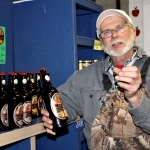

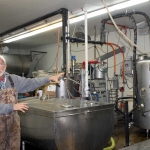
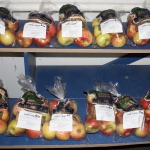
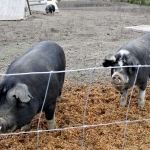
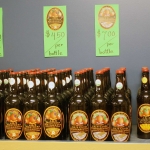
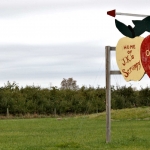
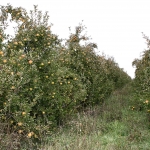





Leave A Comment